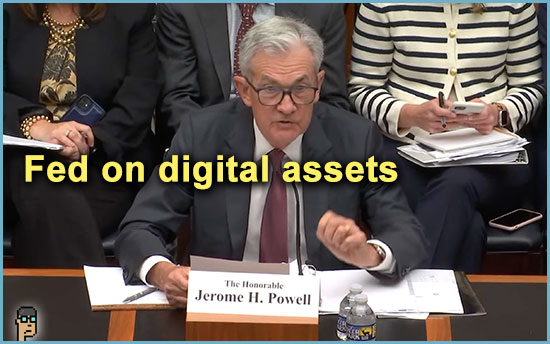Jerome Powell, the Republican Federal Reserve Chair appointed during the Trump administration, appeared before the House Financial Services (HFS) Committee today for his semi-annual hearing, “The Federal Reserve’s Semi-Annual Monetary Policy Report” a.k.a. the Humphrey-Hawkins report.
Although Powell’s prepared testimony was bereft of anything digital asset-related as was the Committee’s agenda for the hearing (see it), Chair Powell’s Q&A with members of Congress provided a taste of hot button digital asset issues for the Fed.
HFS Chair Rep. Patrick McHenry (R, NC) kicked things off right before Powell’s testimony saying before the full Committee that the stablecoin and market structure bills were on the HFS schedule for next month. Chair McHenry stated in the third person:
“The Chair would further announce to committee members that the Chair’s intention is that in the second week we return in July, we will have a markup, and that markup will include two important bills. One is giving digital assets a market structure and federal regulatory remit. And the second is a federal stablecoin regime. It is the intention of the Chair to have that as two pieces of committee markup in the second week when we return in July.”
More precisely, Digital Chamber’s Cody Carbone tweeted the tentative date for markup of both bills is July 19. (See: what is markup?)
After McHenry’s brief announcement, the hearing commenced.
Click below or scroll down for a selection of what Powell said about digital assets in answer to several Members of Congress during the Q&A portion of the hearing. Video is here.
-
-
- Ranking Member Rep. Maxine Waters (D, CA) on payment stablecoins
- Rep. Zach Nunn (R, IA) on central bank digital currencies
- Rep. Warren Davidson (R, OH) on crypto as an asset class
-
(lightly edited for clarity)
Rep. Waters (D, CA): I’ve argued that we should allow states to be part of this process, but we must have a strong enforceable federal floor with the roll by the Federal Reserve to approve and provide oversight of payment stablecoins issued by non-banks in order to ensure that consumers are protected. Such a framework is similar to our dual-banking system and it would ensure that non-banks and banks are treated the same. We should also bear in mind that payments stablecoins are a new form of currency intended to allow individuals to pay for things with them. As such, do you agree that it is important for the Fed as our central bank to have a chance to approve or decline any state license non-bank entity before it starts issuing payments stablecoins nation-wide?
Chair Powell: First of all, let me say we appreciate that we’ve been able to offer our views on these things to your staff and also the Majority staff and we appreciate that consideration is given to our views. We do see payment stablecoins as a form of money. And in all advanced economies, the ultimate source of credibility in money is the central bank. And, we believe that it would be appropriate to have a quite a robust Federal role in what happens in stablecoins going forward and that leaving us with a weak role and allowing a lot of private money creation at the state level would be a mistake. But nonetheless, I do appreciate that we’ve been able to be heard and share our views with with the Committee.
Rep. Zach Nunn (R, IA): I do want to know, specifically for my constituents back home, the thoughts of creating a central bank digital currency (CBDC) that tracks individuals if the Fed were to offer direct individual accounts to citizens, would this be a direct threat to the financial privacy of many Americans?
Chair Powell: Potentially -and that’s why it’s not something we support – accounts at the Federal Reserve by individuals. We’re a long way from this – if we were to support at some point in the future a CBDC, it would be one that would be intermediating through the banking system and not directly at the Fed for exactly the reason you point out.
Rep. Davidson (R, OH) … crypto and digital assets in the US has got a market cap of around $1.1 trillion right now. It’s been there for a bit. Do you acknowledge that this asset class has staying power in the US economy?
Chair Powell: It appears to have some staying power. Of course, that 1.1 trillion… what was that a year ago?… A lot higher.
Rep. Davidson: Yes, it’s had some volatility in large measure due to the lack of legal clarity. And so hopefully this committee will help with that quite a lot here this summer with with at least two bills, one on stablecoins and one on market structure. And there’ll be clear not just for Congress, but for regulators including [Securities and Exchange Commission] Chairman Gensler and obviously market participants: whether they’re forming the ideas, investing in the ideas or participating in the activities in the space.
Powell will visit the Senate Banking Committee tomorrow and do it all over again with Members of the upper chamber beginning at 10 a.m.

